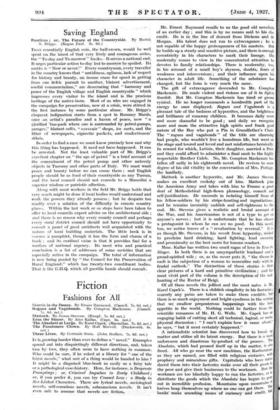Saving England
Rusticus ; or, The Future of the Countryside. By Martiii S. Briggs. (Kagan Paul. 2s. 6d.) TIIAT essentially English coin, the half-crown, would be well spent on the latest of that very liVely and courageous series, the " To-day and To-morrow " books:. It serves a national end. It urges particular action to-day lest-to:morrow be spoiled. Its': motto is 4, Now or never." Every countryman, every traveller in the country khows that " untidiness, ugliness, lick of respect for history and- beauty, an insane craze for speed in getting from one fickle pursuit to another, blatant advertisement', sordid commercialism," are desecrating that " harmony and peace of the English village and English countryside " which impresses every visitor to the island and is the precious heritage of the native-born. Most of us who are engaged in the campaign for preservation, now at a crisis, were stirred in the first, instance by some particular abuse. Mr. Briggs's eloquent indignation starts from a spot in Romney Marsh, Once an artist's paradise and a haven of peace, now " a glorified 'bus-park where one is surrounded by petrol-pumps, garages," blatant cafes, " souvenir " shops, ice carts, and the litter of newspapers, cigarette packets, and confectioners' debris.
In order to find a cure we must know precisely how and why this thing has happened. It need not have happened. It can be arrested. Not the least valuable part of Mr. Briggs's excellent chapter on " the age of petrol " is a brief account of the concealment of the petrol pump and other unlovely objects in Tuscany and other parts of Italy. We must want peace and beauty before we can ensue them ; and English people should be as fond of their countryside as any Tuscan, and the local council should not concede to a Mussolini a superior wisdom or patriotic affection.
Along with most workers in the field Mr. Briggs holds that very much might be done if local bodies would understand and work the powers they already possess ; but he despairs too readily over a solution of the difficulty in remote country places. Within the last week or so steps have been taken to offer to local councils expert advice on the architectural side ; and there is no reason why every county council and perhaps every rural district council should not have opportunity to consult a panel of good architects well acquainted with the nature of local building materials. The little book is in essence a pamphlet, though it has the form and charm of a book ; and its cardinal value is that it provides fuel for a warfare of national urgency. Its most wise and practical conclusion is a list of addresses of some societies that are especially active in the campaign. The total of information is now being pooled by " the Council for the Preservation of Rural England," which has twenty-two constituent bodies. That is the G.H.Q-. which all guerilla bands should consult.






































 Previous page
Previous page